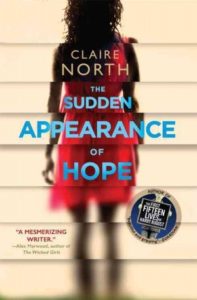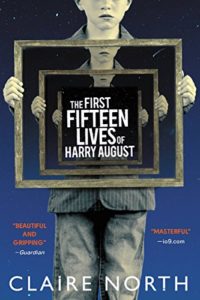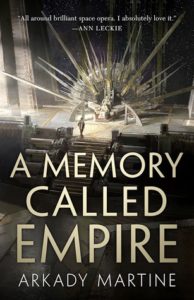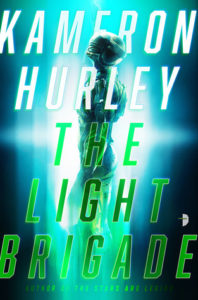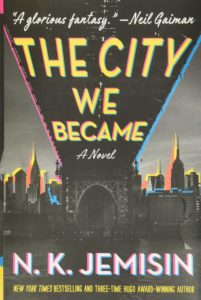 The City We Became, by N.K. Jemisin
The City We Became, by N.K. Jemisin
Synopsis: Five people become embodiments of the five boroughs of New York, as the city struggles to awaken and become sentient, while being opposed by an interdimensional evil.
Book Review: Look, you don’t need me to tell you this is a well-written book. It’s N.K. freakin’ Jemisin, one of my favorite contemporary authors. She wrote one of the top-five most moving books I’ve ever read. She’s a master of the craft, and giant in the genre. But I’ve been putting off writing this post for weeks. I’m dreading posting it. But… we really have to talk about “The City We Became.” Because “The City We Became” is one of the most racist novels I’ve ever read.
I will admit, I haven’t read a lot of racist novels. I tend to avoid them. But the last time I read something this unapologetically racist, it was written in the 70s and I was unable to finish it. Unlike Lucifer’s Hammer, I forced myself to finish this one, because it felt important to be informed on this. It was hard to do.
In “The City We Became” all people can be placed into two groups. Those who “actually love New York” and “those merely occupying and exploiting it.” The former are human beings that may have flaws, but can be empathized with and dealt with as people. The latter are parasites and vermin whose internal experience consists solely of a drive to dominate and degrade all the good people. Fortunately, it’s super easy to tell who belongs to which group. All you have to do is note the color of their skin.
The rest of this review contains spoilers for “The City We Became” because I can’t discuss this without massive spoilers. If you’d like to read the book and be shocked by its overt racism without spoilers, please do so before continuing.
.
.
.
Without fail, every white person in this story is a monster, and all monsters in the story are white. Not just in a passing way, it is explicitly their whiteness that makes them monstrous, and makes them want to destroy and exploit all that is good in the world. In “City”, the only thing you really need to know about someone is the color of their skin to know their moral character. It got to the point that one can tell when a new antagonist or ally is being introduced as soon as their skin color is described. It got to the point of farce when hairstyles that are popular among young white men are called literal signifiers of evil in the same manner that goatees are such in comedy and satire. No, it’s not presented as a joke, it’s presented as bitterly ironic that now such a signifier exists in real life when before it was just the sign of campy script writers.
This isn’t just a subversion of tropes. Having The White Woman be the big bad evil, and having her be the whitest white woman in existance — that’s subversion of tropes. Introducing many supporting characters and side cast who are white specifically to show them being intentionally malicious over and over… that’s not trope subversion, it’s just the standard demonization any hate group engages in.
The one attempt to portray a white person in a “sympathetic” light focuses on a mentally handicapped white woman, because I guess only a mental handicap can be considered a plausible excuse for the moral sin of being white. Nonetheless, she ultimately gives in to her hateful white nature, and by narrative fiat Staton Island is ejected from what is the True New York City and replaced with a borough that has the correct racial demographics for a “good” city.
I know it’s hard to believe. Please read it yourself to confirm.
This is a shame, because there are some really interesting ideas growing beneath the pall of hatred in the text. For example, the heroes are presented with the possibility that they might be able to save tens of thousands of lives, at the expense of sacrificing their own families. They reject this option out of hand, but it does make one stop to think… why was it rejected so readily? This is a classic trolley problem, wouldn’t heroes at least agonize for a bit over pulling the lever?
Cleverly, this is a set-up for an even bigger reveal later, where we discover that a city becoming sentient requires the annihilation of tens of thousands of universes. Not planets, not even galaxies, but full *universes.* Uncountable trillions upon trillions of people will die, if our heroes succeed and New York awakens. If they fail, consequences are bad for our heroes — the wiping out of Pompeii happened when it failed to wake up, and the erasure of Atlantis happened for the same reason. On the other hand, the evil White Woman seems to have been getting better at stopping cities from awakening with lessened consequences. Her last victory was preventing New Orleans from waking up. The devastation wrought by Katrina as a consequence of failing to awaken was awful for that city and its people, but it was a far cry from being wiped out. And importantly – even if New York was completely annihilated, it’s still an insignificant harm when compared to killing *tens of thousands of universes* of people. It seems that the White Woman is the true hero, in an objective sense, and our protagonists are the monsters willing to kill any number of innocents to protect themselves. This is a brilliant narrative twist, and it’s exactly the sort of fantastic moral complexity that I expect from Jemisin after reading her Broken Earth trilogy.
And yet, this takes a distant back seat to the constant racial animus. Instead of focusing on the emotional twisting of choosing to become a monster to save your family, we are treated to the spectacle of tolerance being portrayed as a vicious character flaw that evil people delight in.
This leads me to…
Why?: What was the purpose of writing a novel-length racist screed? I have a very hard time imaging the author of the Broken Earth trilogy as someone who is committed to racism!
My best guess is that this was done as an homage to Lovecraft. The book itself dons the mantle of a Lovecraftian horror. It names the Lady In White as such in those exact words. The evil city from the other dimension is named R’lyeh. This isn’t a subtle hint, it’s in the actual text. And the thing that Lovecraft is most known for in pop culture (behind C’thulu) is his rampant racism. If one was trying to fully recapture the Lovecraftian experience, but for a modern day audience, one may very well attempt to make it as racist as possible, to really get that Lovecraft stink on it. If this was the intention, bravo. It was pulled off magnificently.
I’m torn as to whether this is a good thing, though. On the one hand, I personally find it distasteful, and I think there are some things we’d be better off leaving in the past. On the other hand, the essence of horror is to make the reader uncomfortable. You are supposed to be squicked out and repulsed by a good horror novel, right? You’re supposed to be fascinated by the depravity, in a “I can’t look away from this horrific thing that’s happening” sort of way?
But then… why are the more standard forms of racism not acceptable when used in that manner? Maybe it’s just because they’re so passe. When I read regular old “Lucifer’s Hammer”-style racism, I throw some invective at the bigotted author and I stop reading. I even said in my review that “it’s always fun to rip on bigots for a while.” I guess that’s only true when they’re in your outgroup. This review was NOT fun to write. I feel kinda sick writing it. If that’s the goal of a horror novel, the goal was accomplished.
I think this wouldn’t have affected me as much if I hadn’t recently read Jemisin’s “Emergency Skin.” A complaint of several other readers was that Emergency Skin felt like a serious representation of the author’s views. I held that it was obviously satire of bad message fiction. It was so blatantly over the top and absurd that it could only have been meant as satire. After all, there’s no way I could imaging the author of the Broken Earth trilogy seriously supporting *exterminationist rhetoric of a minority demographic.*
And yet, I’ve now found myself saying that I can’t imagine something like that twice, and I’m starting to get nervous. I’m starting to feel like the guy at the party who thought we were all laughing at Steven Colbert’s caricature of a racist talk show host, and is starting to realize everyone else is laughing at the joke about how awful minorities are for real.
I dunno. I think we all went a little crazy over the last four years, living under Trump. Everyone’s stressed out, everything is more polarized, the world’s on edge. We’ve had a pandemic and a coup attempt, and people were circling the wagons. Maybe now that Orange Man is gone and the pandemic’s about to be crushed, things will cool off. The last thing I want to see is a resurgence of racism in SF.
In summary: Not Recommended.
For book clubs: Still Not Recommended, but you can probably get a lot of discussion out of it if your group is willing to tackle a problematic novel.






